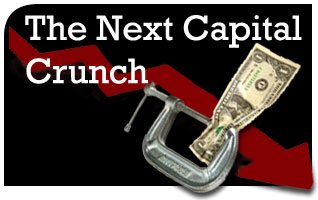 To anyone who is watching the markets, it is obvious that our economy is in deep financial trouble. The immense amount of money pouring into the black hole of needed credit points to a crisis of unimaginable proportions that was long in the making.
To anyone who is watching the markets, it is obvious that our economy is in deep financial trouble. The immense amount of money pouring into the black hole of needed credit points to a crisis of unimaginable proportions that was long in the making.
To anyone who is watching the markets, it is obvious that our economy is in deep financial trouble. The immense amount of money pouring into the black hole of needed credit points to a crisis of unimaginable proportions that was long in the making.
Understanding modern economy is not for the uninitiated. There are few laymen versed in the fickleness of markets and mysterious complexity of our interconnected systems. The technical explanations of what is happening are best left to bickering economists – if indeed they can explain it adequately.
However, economics is not totally detached from other fields of human endeavor and so by observing society that one can safely venture an opinion that might shed some light on the present crisis…and the next.
In simple laymen’s terms, much of the present crisis came from pressure to provide politically correct “affordable housing” which in turn led to subprime loans to people who could not afford to buy their homes. The loans led to loose credit for bad credit risks, bad mortgages written up for quick profits, bundled up into investment packages, and sold to eager investors.
Simple logic leads us to isolate the players who are involved in this explosive mixture.
Of course, there were those who let the loans happen. However, there were also those who took advantage of the gaping hole in the new system to maximize their earnings. There were the bankers who eagerly sought after and wrote up the questionable mortgages to increase their commissions. There were improvident buyers who bought homes on terms they could not fulfill.
There were wheeling and dealing investment firms that bundled up these loans to sell them to investors in a booming market. There were investors of all kinds who bought these questionable mortgages hoping for a better than average return on investment. Finally, there is a federal government to bail everyone out who found themselves high and dry when the bottom fell out of the real estate market and the notes came due.
Until the final episode, all this took place in apparent normality. It was pure economics. To all outward appearance, most of the players did nothing illegal. Each was trying to get his piece of the action in the spiraling upward swing in the real estate market.
But beneath the transactions, there is a disconcerting consistency in many of the most active players of the game. One can see how many players threw caution to the wind and took maximum advantage of the system. Many were pushing ever farther their lack of restraint to make their precarious deals. They passed on ever-greater risks to others. They used every trick in the trade to leverage dollars beyond their value. Everyone seemed to ride the bubble for all it was worth – insurers, brokerage firms, and appraisers. Finally, many acted with a bailout assumption that would assure that their bad acts would have no serious consequences for themselves.
Of course, there have always been those few who have used the system to their advantage. But in today’s globalized world, the possibilities of milking the system have grown exponentially. The consequences of unscrupulous acts can have huge consequences that involve hundreds of billions of dollars and cause untold human suffering.
This is beyond mere greed. That so many could have acted with such careless abandon points to something much more serious than bad economics.
It points to a moral crisis. When men act without restraint in face of a threat to the common good, it means that the moral infrastructure of society is at risk. When the consuming passion for selfish gain becomes the dominant set of values in society, it means duty, responsibility and honor no longer resonate in society.
And who can doubt it? Is it any wonder that players in the credit crunch game would act in a manner any different from our culture of instant gratification? In a society that does everything to try to deprive acts of their moral dimension and consequences, who should be surprised if these players are only following suit?
When people flee from responsibility in their personal lives, is it any wonder debt accumulates so rapidly? When people spend what they do not have and receive what they cannot pay for in their personal lives, should we be surprised when we see this transferred into the world of high finance? Isn’t all this a sign that something is terribly wrong with our moral bearings? One can only ask what other surprises lay ahead.
Thus, although it may seem unrelated, this carefree mentality highlights why the moral issues that divide the nation have such great importance. These are the issues that deal with another kind of capital: our moral capital. Institutions like family, community and religion are what preserve what remains of our moral values, guide us to act with restraint in our lives and safeguard our meager moral capital.
The latest crisis is shocking but it only heralds a greater crisis.
It is the next great capital crisis – a moral capital crisis — that is to be feared. If this moral capital is lost, there is no amount of regulation that can restrain the consuming passion of the players. There are not enough rescue dollars to plug the holes of all the other crises that will follow.

